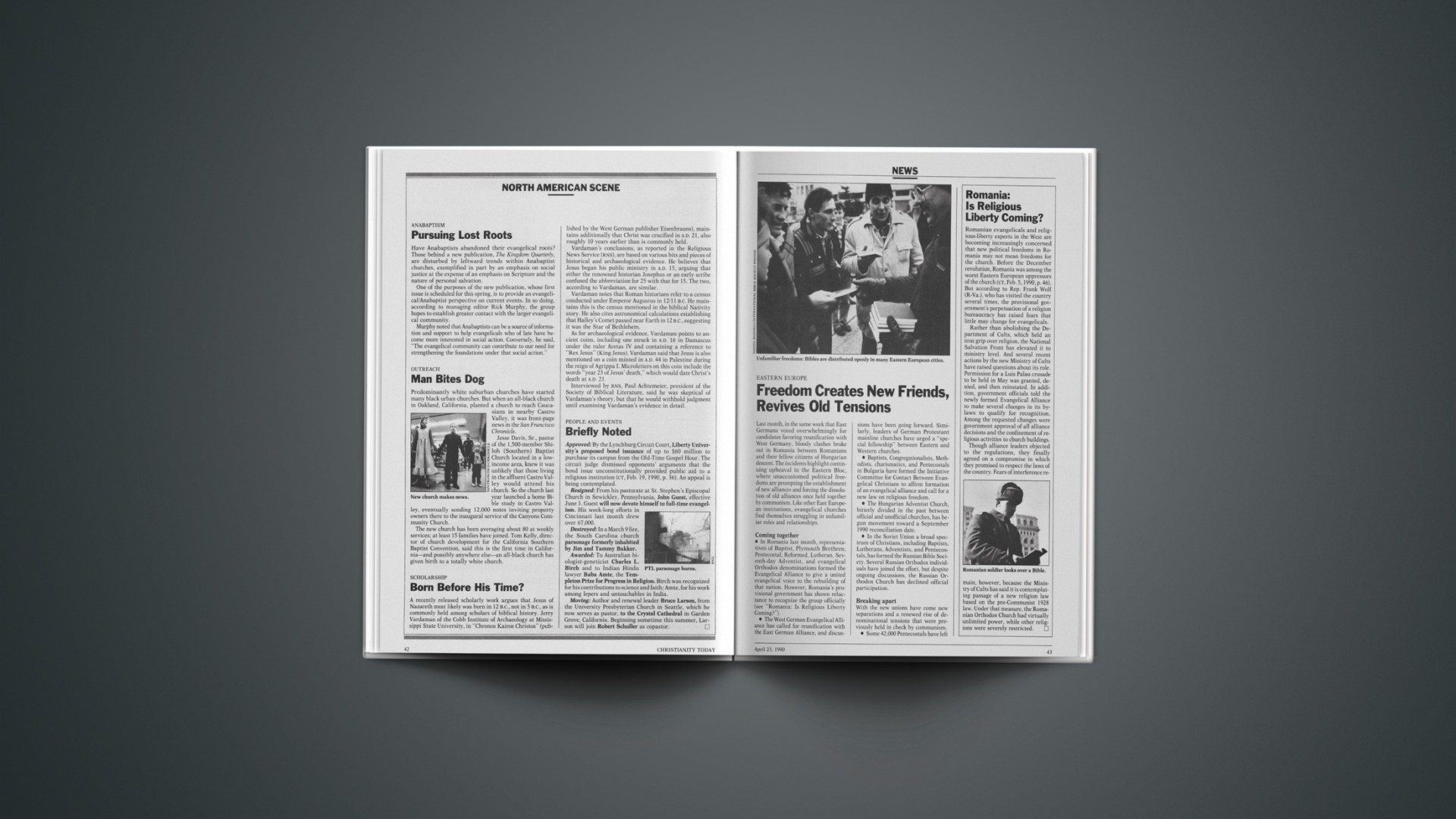Last month, in the same week that East Germans voted overwhelmingly for candidates favoring reunification with West Germany, bloody clashes broke out in Romania between Romanians and their fellow citizens of Hungarian descent. The incidents highlight continuing upheaval in the Eastern Bloc, where unaccustomed political freedoms are prompting the establishment of new alliances and forcing the dissolution of old alliances once held together by communism. Like other East European institutions, evangelical churches find themselves struggling in unfamiliar roles and relationships.
Coming Together
• In Romania last month, representatives of Baptist, Plymouth Brethren, Pentecostal, Reformed, Lutheran, Seventh-day Adventist, and evangelical Orthodox denominations formed the Evangelical Alliance to give a united evangelical voice to the rebuilding of that nation. However, Romania’s provisional government has shown reluctance to recognize the group officially (see “Romania: Is Religious Liberty Coming?”).
• The West German Evangelical Alliance has called for reunification with the East German Alliance, and discussions have been going forward. Similarly, leaders of German Protestant mainline churches have urged a “special fellowship” between Eastern and Western churches.
• Baptists, Congregationalists, Methodists, charismatics, and Pentecostals in Bulgaria have formed the Initiative Committee for Contact Between Evangelical Christians to affirm formation of an evangelical alliance and call for a new law on religious freedom.
• The Hungarian Adventist Church, bitterly divided in the past between official and unofficial churches, has begun movement toward a September 1990 reconciliation date.
• In the Soviet Union a broad spectrum of Christians, including Baptists, Lutherans, Adventists, and Pentecostals, has formed the Russian Bible Society. Several Russian Orthodox individuals have joined the effort, but despite ongoing discussions, the Russian Orthodox Church has declined official participation.
Romania: Is Religious Liberty Coming?
Romanian evangelicals and religious-liberty experts in the West are becoming increasingly concerned that new political freedoms in Romania may not mean freedoms for the church. Before the December revolution, Romania was among the worst Eastern European oppressors of the church (CT, Feb. 5, 1990, p. 46). But according to Rep. Frank Wolf (R-Va.), who has visited the country several times, the provisional government’s perpetuation of a religion bureaucracy has raised fears that little may change for evangelicals.
Rather than abolishing the Department of Cults, which held an iron grip over religion, the National Salvation Front has elevated it to ministry level. And several recent actions by the new Ministry of Cults have raised questions about its role. Permission for a Luis Palau crusade to be held in May was granted, denied, and then reinstated. In addition, government officials told the newly formed Evangelical Alliance to make several changes in its bylaws to qualify for recognition. Among the requested changes were government approval of all alliance decisions and the confinement of religious activities to church buildings.
Though alliance leaders objected to the regulations, they finally agreed on a compromise in which they promised to respect the laws of the country. Fears of interference remain, however, because the Ministry of Cults has said it is contemplating passage of a new religion law based on the pre-Communist 1928 law. Under that measure, the Romanian Orthodox Church had virtually unlimited power, while other religions were severely restricted.
Breaking Apart
With the new unions have come new separations and a renewed rise of denominational tensions that were previously held in check by communism.
• Some 42,000 Pentecostals have left the Union of Evangelical Christians-Baptists (formerly the All-Union Council of Evangelical Christians-Baptists) in the USSR to begin their own denomination. The Union itself has reorganized and abolished the office of general secretary held since 1971 by Alexei Bichkov.
• Stating that it had fulfilled its 45-year-old mission, Hungary’s Council of Free Churches disbanded late last fall.
• Polish evangelicals have increasingly voiced fears that a Catholic-dominated Solidarity is shutting out the tiny evangelical population there. Protestants are concerned that an official national Catholic church would relegate them to the status of restricted minorities.
• Deep mistrust of old leaders who accommodated Communist policies is causing rifts in denominations throughout Eastern Europe. In East Germany, for example, Bishop Horst Gienke of the Protestant Church in the Greifswald region was forced out after a no-confidence vote by the synod. In Romania, several bishops and other high-ranking church officials have either stepped down or were forced to flee the country.
“Although there has been very good reason for euphoria about developments in Eastern Europe, we need to understand that the development of democracy is not automatic with the retreat of communism,” said Kent Hill, executive director of the Institute on Religion and Democracy. “The early nineties are going to be fraught with both opportunities and dangers, and the news coming out of there is going to be quite complex.”
By Kim A. Lawton.










